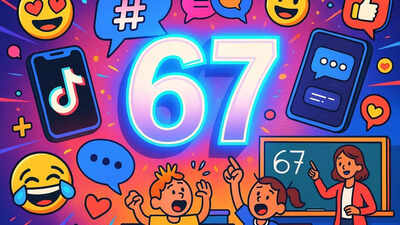ARTICLE AD BOX

It’s official. The Word of the Year for 2025 is not a word at all. Dictionary.com has crowned “67” as the defining expression of the year, a viral, meaningless, meme-fuelled number that somehow managed to capture the collective chaos of the internet.
It is part song lyric, part social media chant and part generational inside joke. The number has been shouted in classrooms, echoed in TikToks, parodied in South Park and even used by teachers to get students’ attention. Nobody can quite explain why “67” matters, and that is precisely why it does.
'67': The birth of a meaningless sensation
“67” began its life as a throwaway lyric in the 2024 song Doot Doot by rapper Skrilla, who raps, “6-7, I just bipped right on the highway.”
There was no intended depth to the phrase, but the internet thrives on absurdity. Within months, the two numbers became a rallying cry across TikTok, appearing in millions of memes, remixes and reaction videos.Basketball fans connected the phrase to NBA star LaMelo Ball, who happens to be six feet seven inches tall. Video edits of Ball dribbling or celebrating began trending under the hashtag #67. In interviews, Ball jokingly referred to the chant as his “new nickname.”
Before long, “six, seven” had become an online shorthand for enthusiasm, energy and inside humour among Gen Alpha users.
From meme to mainstream
When Dictionary.com announced “67” as its Word of the Year, it acknowledged that the phrase had no defined meaning. Editors described it as “part inside joke, part social signal and part performance.” The website said that “67” captured the spirit of modern internet culture, where memes serve as emotional shorthand and meaning is often replaced by shared experience.TikTok analytics show more than two million posts under the #67 hashtag, with usage spiking in September and October as students returned to school. Some users have taken to describing “67” as a kind of secret handshake among Gen Alpha, a symbol of belonging in the digital playground.
Teachers versus TikTok
The rise of “67” has turned classrooms into unexpected battlegrounds. Teachers report students shouting “six” and waiting for the rest of the class to yell “seven” in reply.
One teacher in a viral clip tried to harness the trend by using it as a call-and-response tactic, saying “six” to signal quiet. Others have banned the number altogether, frustrated by the distraction.On the flip side, some educators have used the meme to connect with their students. A few schools even incorporated “67” into lessons on digital culture and media literacy, showing how trends evolve in the age of social media.The announcement has been met with a mix of amusement and disbelief. Linguists note that this is not the first time an unconventional choice has made the Word of the Year list. Previous years saw picks such as “emoji,” “selfie” and “rizz,” each reflecting the way language evolves alongside technology.However, critics argue that naming a number trivialises the purpose of a dictionary. Some have called “67” a symptom of what Oxford University Press labelled “brain rot” last year, referring to meaningless or low-quality online content that dominates digital spaces.
Supporters counter that language is no longer confined to traditional words and that the phenomenon highlights how expression is changing in the digital era.
Why it matters (even if it doesn’t)
The rise of “67” illustrates a shift in communication from meaning to emotion. In 2025, a phrase does not need to make sense to go viral; it only needs to evoke a reaction. “67” works because it is simple, rhythmically satisfying and easy to mimic. It allows users to express excitement or belonging without saying anything concrete.As Dictionary.com explained, “When people say it, they are not describing something; they are expressing it.” In that sense, “67” is less about language and more about shared energy, a symbol of how young people connect through humour and randomness.

 1 day ago
8
1 day ago
8








 English (US) ·
English (US) ·